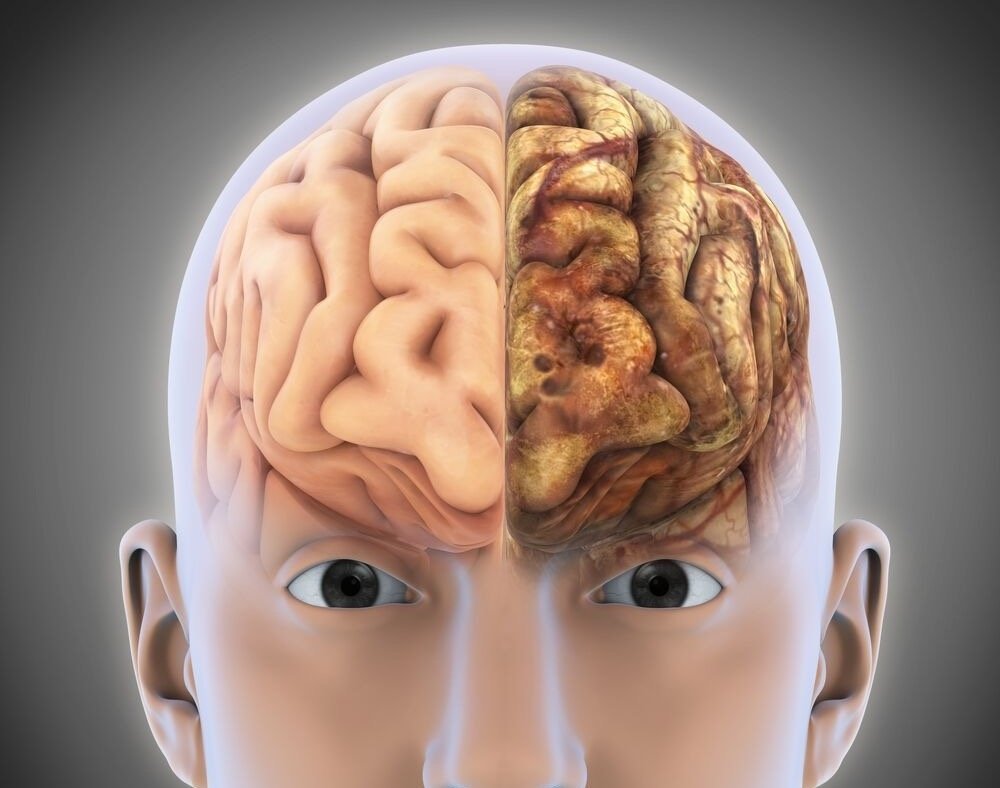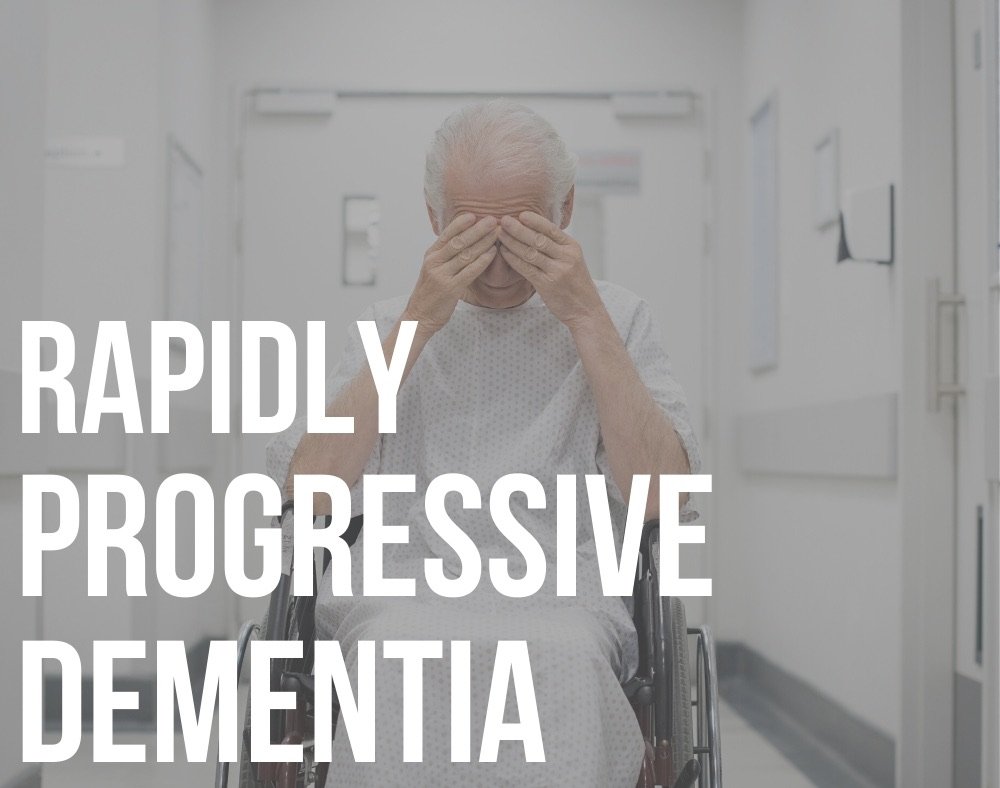Over the course of our studies, we discovered different types of dementia, including rapidly progressive dementia (RPD).
This is a form of dementia where deterioration from onset happens at a SPEEDY rate when you compare it to other dementias.
Experts, most of the time, predict two years as the time frame for the development of the illness. However, in most cases, RPD usually develops sub-acutely in a few weeks or months.
Various factors can lead to the development of RPD like:
- Prion disease like CJD (Creutzfeldt-Jakob disease)
- Non-prion neurodegenerative diseases such as Alzheimer’s disease or frontotemporal dementia
- Infections like HIV, HSV, and Whipple disease
- Exposure to toxic substances
- Vascular illnesses like vascular dementia and stroke
- Neoplasm e.g., CNC lymphoma & Metastases, etc.
- Vitamin deficiencies
- Medication toxicity
- Recurrent seizures
- Impaired blood flow to and in the brain, etc.
The progression of RPD is different from one person to another because it mostly depends on the cause.
Persons with the disease usually develop problems with communication, movements, thinking, and personality.
Let’s find out more RPD explicitly touching on the diagnosis process and available treatment options.
Rapidly Progressive Dementia Diagnosis

RPD is rare and challenging to diagnose. Nonetheless, accurate and early diagnosis is essential because a majority of the causes of the illness are treatable.
If you suspect that a person has the illness, it is advisable to see a doctor who specializes in these medical conditions.
The professional then makes a proper diagnosis.
The practitioner might ask some questions concerning the medical history of the person suspected to have the illness, the progression of symptoms, recent possible exposures i.e. from toxins, infections, chemicals, or travel as well as any similar diseases present in biological relatives.
Thorough documentation of all medications, both prescribed and non-prescribed, is also imperative.
The medics also perform CAREFUL physical examinations. These help spot any physical issues as well as evaluate the current mental function level.
These examinations determine whether there are other neurologic features present and whether there are any organs in the body that are affected by the illness.
To confirm whether a person has rapidly progressive dementia or not, doctors normally combine different types of diagnosis methods to come up with conclusive results. These include:
Rapidly Progressive Dementia Tests
Laboratory Tests

Ancillary testing is crucial mainly because many RPDs have similar clinical features.
Doctors may request various laboratory tests that may include:
- Blood tests
- Urine tests
- Brain imaging like electroencephalogram which measures electrical activity in the brain from the scalp, MRI or CT.
- Cerebrospinal fluid tests which involves looking at the clear fluid that surrounds the spinal cord and the brain.
The results that the doctor will gather from the tests can HELP to determine the cause of the disease.
Lumbar Punctures

A lumbar puncture or CSF can also be performed on a person to determine if they have rapidly progressive dementia.
It is usually beneficial for persons who have neoplastic, infectious, or autoimmune disorders.
EEG
Some doctors also find that it is necessary to conduct EEG in a bid to rule out seizures as one of the causes of RPD.
Brain Biopsy
In a few cases, a brain biopsy is necessary.
RPD Treatment Options

Regarding rapidly progressive dementia, it is important to mention that treatment for most cases of RPD is palliative.
The illness is perpetually fatal, and experts give it a median survival rate of 6-11 months even though some people can live for three years upwards.
On the other hand, some types of RPD are reversible if doctors can efficiently treat the cause of the disease.
For instance, if the illness is a result of hormonal imbalance or cancer, treatment CAN TARGET these specific conditions in a bid to help treat RPD.
Some treatment options that may help curb treatable RPD include:
Paraneoplastic and Autoimmune Encephalopathies

If medical practitioners suspect autoimmune encephalopathy, they will recommend a trial of immunotherapy for the ill person, which will help to treat RPD in responsive persons.
Immunotherapy, however, does not work when the person with dementia has infections that will become worse after immunosuppression.
Physicians also avoid steroids when lymphoma is differential because it can DELAY EFFICIENT treatment. Worth noting is that steroid trials work as diagnostic tests as well as treatment options.
This implies that doctors need to administer a high dosage for a clear clinical response.
The doctor will determine the number of steroids to give out because currently, there is no documentation on the minimum steroid dose that is sufficient to treat dementias that are immune-mediated.
Persons who cannot tolerate steroids will often go through PLEX (plasma exchange) or a course of IVIg.
Toxic Metabolic

To treat toxic-metabolic etiologies, doctors will first find out the specific disorder that they need to tackle.
Thiamine deficiency is one of the disorders that has proven to be more affordable and easier to treat empirically rather than going in to rest the thiamine levels.
Specialists use A COMBINATION of glucose and thiamine to treat a person who has Wernicke encephalopathy to help with treatment.
Taking Care of Infectious RPD

When it comes to treating infectious rapidly progressive dementia, infectious disease specialists should first detect the type of infection that the person had before recommending the appropriate treatment.
For example, antivirals are normally suggested to individuals who have viral encephalitis. Medics also screen persons with RPD to look for infections like Lyme disease, syphilis, and HIV.
When diagnosed EARLY enough, such infections are treatable.
This is one of the reasons why it is essential to consult the specialists soon enough so that they have adequate time to identify and treat the infection before it is too late.
Maintenance Therapy

Studies indicate that persons who have positive responses to immunotherapy trials often require long-term treatment because relapse rates are usually high.
Individuals with RPD must, therefore, also go through maintenance therapy to maintain remission. Most people will go through suitable osteoporosis and screening for latent tuberculosis as part of this process.
Clinicians will, however, advise on the best approach for maintenance therapy depending on an individual’s progress regarding treatment.
Antiviral Medications

These are medications that come in handy, especially in cases where prion diseases cause RPD.
The medicines, when administered in the right way, help to significantly improve clinical status where persons with the illness record a relapse of symptoms.
Depending on the individual, a doctor can also prescribe anticonvulsants to help deal with seizures.
Doctors may also prescribe other forms of medications that will offer relief to the persons with RPD, depending on why they got the illness in the first place.
In instances where the individual does not have the option to take medicine, the TREATMENT approach mainly FOCUSES on improving the quality of life and making sure that a person is as comfortable as possible.
Some of the options available when it comes to this include:
In-Home Care

Because many people who have rapidly progressive dementia do not have many years to live, it is advisable to think of collaborating with an in-home care agency.
These are companies that have the experience and the expertise needed to care for a person who has medical conditions like RPD.
It works well for families that want their loved ones to stay at home while receiving expert care round the clock.
Staying in a familiar environment is beneficial as it helps to offer persons with RPD peace of mind and security.
This also allows NON-PROFESSIONAL caregivers (friends and relatives) to go on about their business so that they can spend time with their unwell relatives when they are free without feeling too overwhelmed.
In-home care professionals may offer services like assistance with dressing, walking, grooming, bathing, as well as medication reminders, appointment transportation, light housekeeping, meal preparations, errands, and shopping, amongst others.
Take time before working with any in-home agency to ensure you settle on the RIGHT FIT for the affected individual.
Above all, ensure that the person who will be spending time with the person with RPD has proper qualifications and preferably has experience working with persons who have this type of dementia.
When in-home care does not give the results a family is looking for, it is probably best to look for an appropriate care facility that will be in tune with the needs of the ill individual until they take their last breath.
Working with Routines

It may also help to develop routines that the person will follow. Many individuals with RPD find comfort in routines. This is because, when crafted well, they help to reduce anxiety and confusion.
Routines can include waking up, sleeping, exercising, and eating at specific times.
For instance, an individual can wake up at six am have breakfast at seven am shower an hour later, rest, eat lunch at one, participate in an activity at three, go for an evening walk or exercise at five and retire to bed at eight pm.
Remember that when coming up with routines, it helps to consider the needs of the suffering person so that their day is full of activities they enjoy and love.
The routine should also not be cast in stone. It should be adjusted along the way to ensure the person with dementia has productive and comforting days.
Conclusion
Rapidly developing dementia, unlike other forms of dementia, usually develops at a fast rate.
While some cases of RPD are treatable after early diagnosis, others are irreversible, depending on the cause. If a loved one ever gets RPD, it is best to consult a doctor as soon as possible.
It is important to know the next steps to take to ensure a person receives the right treatment. Not to mention, lives comfortably until the illness runs its course.

